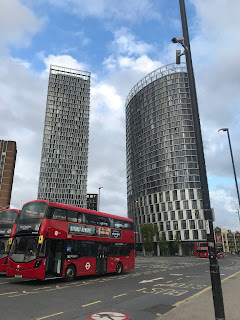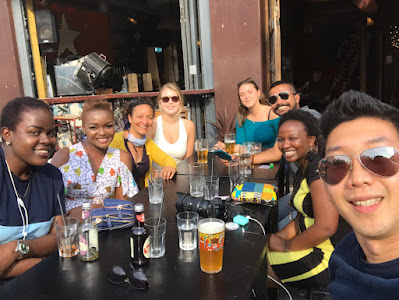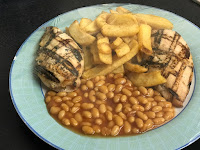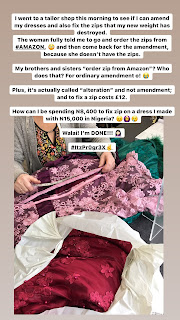Dear International Student…
 |
| Escalators in some London train stations |
2. Just immediately after you alight the plane you’ll be met with long-ass escalators which looks like they’re taking you to heaven. Some of you may already be familiar with them, some may not, and just like me, you may develop a phobia for escalators and feel like you’re gonna fall down when you place your first foot on it, but don’t worry, it’ll soon become your friend.
 |
| Stratford Coach Station, London. |
3. You’ll begin to hear phrases like “get a coach”!
Don’t look clueless! It’s just another way of saying “get a bus”. Speaking about buses, don’t forget to press the bell as you approach your stop, otherwise you’ll know what it means to trek long distances, and you’ll be so sorry if sadly, you have luggage; because here there’s no Okada! Read the story of my life here.
 |
| Poplar, DLR station, London |
4. Terms like Tube, Underground, Overground, TFL, DLR, and National rail may perhaps sound Greek to you, but you’ll learn them as you move around more. You might wonder why you feel deafened whenever you’re on the Underground, but don’t worry, there’s nothing wrong with your hearing, you’ll get used to that deafening noise too.
5. If you find yourself in London, don’t get confused when you hear locations like WOOLWICH pronounced as WOOLISH,
– GREENWICH pronounced as GREENISH,
– QUAY as KEY,
– SURREY as SORRY,
– SOUTHWARK as SURDOK
– FLITWICK as FLITICK, and a host of others.
As they say, if you can’t beat them, you join them!
6. You’ll miss your train or bus a few times because of “Africa-man-time”, but nobody will tell you before you’ll learn to keep up with the “British-man-time”.
 |
| British coins |
7. You’ll develop a high blood pressure if you continue to convert pounds £ to Naira, or your country’s currency; because everything will automatically look expensive to you when you convert, but it’s one of the things you can’t stop yourself from doing, until after a long time.
8. Don’t blame yourself if after paying for an item in the shop, you spend a long time checking and trying to calculate the coins/pence change you have received; and consequently keeping people in the queue waiting.
We all struggled to familiarise ourselves with the currency.
 |
| Primark, Westfield Mall, London |
 |
| Location: Primark, Westfield Mall, London |
9. You’ll be tempted to shop, shop and shop! But you don’t really have to prioritize fashion right now if you can’t afford it. However, if you have to shop for clothes and stuff, I’ll recommend that you keep PRIMARK or Charity shops as your plug for now! In the Uk, nobody really cares about what you’re wearing, what’s important is that you wear something!
10. Don’t worry about getting missing or missing your way, feel free to always ask someone, you’ll find many nice and polite people on the streets of the UK. Also, you will need to be friends with Google Maps!
11. You’ll hear phrases like “do you live local?” Don’t take offense, they’re only asking if you live around the area.
12. The English you hear will be different from what you’re already used to, and you may not easily understand what people are saying even though they’re speaking English. It is often because they speak a bit faster than you’re used to. But don’t worry, just pay attention, you’ll soon get used to it.
13. From what I have observed, English people don’t stress themselves with pronouncing words the way we (non-native English speakers) were taught to. But there’s a trick to their pronunciations which you can learn more about; I call it the “Nobody-will-Know” style. See the pronunciation hacks here.
14. Many words you know will sound Greek to you, but don’t worry, you’ll learn.
- You’ll hear words like Q-KOMBER, don’t mind them, what they mean is CUCUMBER!
- COMMUNICATION will be pronounced as Q-MUNIKATION, both mean the same thing.
- If you’re thirsty, walk into a shop and say you want “a BOR-HOL of WUR-HA, the seller will understand that you mean BOTTLE OF WATER!
- Words like PHOTOS will be pronounced as PHO-HOS; EXCITED as EXCY-ED; BRIGHTON as BRY-INN, etc,. Don’t worry, it’s just because the Brits often drink the “T”, in their words.
15. And speaking about Tea, you’ll have so many TEA and COFFEE BREAKS during lectures and meetings. And it’s not your fault if, like me, you begin to wonder what’s so special about the TEA and COFFEE that they can’t do without it. However, you too will soon start drinking.
16. Cigarette breaks will soon become a norm for you, and even though you don’t smoke, you’ll have to take it too.
17. For Lectures, try to read ahead before class and be bold enough to ask questions if you have any, but don’t be too forward.
18. Emailing is their way of communication around here. Don’t be afraid to send your lecturers emails, or ask for clarifications, they’re always happy to help!
19. Also, if you hate writing, you better learn to start loving it, because the UK and ESSAY WRITING is like husband and wife! You may be lucky to get good scores, you may not. But don’t condemn yourself if you don’t. Sometimes it depends on the lecturer’s mood when they’re marking. Lol…
20. Don’t base your intelligence on the grades, focus more on the “take-homes” from the course; employers/society need the knowledge more, and not the grades!
SLANGS/NORMS
21. For Nigerians, the “fresh pepper” you know will become SCOTCH BONNET.
The eggroll you know will become SCOTCH EGG.
You’ll also wonder why groundnut is referred to as PEANUT;
And Traveling-box as SUITCASE!
22. When you do something very impressive they compliment you by using the word “Sick”, e.g. “That was sick”, “Her dress is sick”, etc,. Don’t feel insulted, it’s nothing but a compliment.
“That’s a good shout”, is a British slang that means “that’s a good idea”!
23. They’ll call their friend “mate”; it doesn’t necessarily mean “age mate”, it’s just their colloquial. And you’ll often hear them saying: “You alright mate”? Which is the same way Nigerians will say in Pidgin English: “Guy, what’s up na”? Or “Guy, how far”? “How body”? etc,.
24. Some of your British friends will say to you “Let’s go for a drink”, without asking if you have money or not. Keep in mind that for every outing you go for, you’re paying for your own drinks!
 |
| Progress Oberiko with Coursemates at a Brighton pub |
25. Once you step your feet in this country you’ll realize that “TIME NA MONEY”! (Pidgin English)
26. If you’re running late for an invitation, it’s polite to text the person to inform them that you’ll be late.
Quick tip: If you’re a lady, don’t miss your train because you’re trying to get your makeup done, you can always complete your makeup while you’re sitting on the train/bus.
27. Don’t make the mistake of using the word DRUGS to refer to Medications; these two terms are opposed to each other. The former is considered negative whilst the latter is not. Medication is the term they understand here.
28. “Other half” is also a term used to mean girlfriend or boyfriend.
29. When they say a guy is “Moving to a girl”, he’s simply asking her out. Thus “move to” is synonymous with “toast”, “gist”, “chyk”, which all together means “to fancy a lady/guy and ask them out”.
30. When they say “I’m not sure”, they mean “I don’t know” or “NO”. You don’t need to ask twice after they’ve said that.
31. When they feel pity for you they’ll say “IT’S A SHAME”, don’t be embarrassed or feel insulted. They don’t mean “SHAME ON YOU”, it’s just another way of saying IT’S A PITY! Read my experience here.
32. You’ll notice that when chatting, they end most of their sentences with an “X” or “xx”. it’s nothing bad, it means “kisses”.
33. In terms of dressing, in the UK you don’t just dress according to how you feel like, you first check the weather and then dress according to what it says. But also, if you can, I’d say avoid wearing a hoodie over your head, especially when entering a shop; to avoid being treated as a suspect, because in London, hoodies are often associated with crime and gangs.
34. A very very important skill you should learn is to say “THANK YOU”, including to the bus driver, and everyone else, even though you’re paying for their service.
35. Another thing you might need to learn is how to smile a FAKE SMILE! Everybody does it, and you’ll find yourself doing it too. Don’t ask me why you’ll find out yourself!
36. You’ll find that everybody here is “excited” about something, and that everything is exciting to them. And soon enough you too will join the train of adding “excited” in your sentences.
37. And if you’re Black, you’ll find that Black means something entirely different around here.
 |
| Progress Oberiko Modeling for Crisis UK |
38. Overall, MAKE FRIENDS!!!
You’ll be tempted to only stick with people that look like you, share the same color as you, or are from the same country as you, but I’ll recommend that you leave your comfort zone and make friends across board! Make friends with Spanish, Italian, French, Indian, Caribbean, Americans, etc, that way you’ll learn faster and become more diverse in knowledge!
39. Also, don’t be afraid to take yourself on adventures, including eating everything new that comes your way! Save all those Garri, Egusi, Ogbolor, and all the local foodstuffs that you brought here, for later, and let your stomach explore! Kpata kpata, na only purge you go purge! (Pidgin English).
 |
| Boiled Irish potatoes, Veg, and fish |
 |
| Foreign dish at an Australian restaurant |
 |
| Baked beans, chips and steak |
 40. Arriving here will teach you to value your culture, especially in terms of food and fabrics. If as an African, you are a lover of Ankara attire and other Afrocentric clothing, I will recommend you make as many as you think you will need from your home country, before leaving. Experience has taught me that it is best to make traditional clothes from back home, because of the cost of making African clothes here. I can recall my experience when I wanted to amend some of my African dresses, the cost of ‘alteration’ as they call it, sent me back home with my clothes unamended. See the photo for the story of my life.
40. Arriving here will teach you to value your culture, especially in terms of food and fabrics. If as an African, you are a lover of Ankara attire and other Afrocentric clothing, I will recommend you make as many as you think you will need from your home country, before leaving. Experience has taught me that it is best to make traditional clothes from back home, because of the cost of making African clothes here. I can recall my experience when I wanted to amend some of my African dresses, the cost of ‘alteration’ as they call it, sent me back home with my clothes unamended. See the photo for the story of my life.
 |
| Before |
 |
| After |
41. In case you wonder why many International students or Africans start growing dreadlocks or cut their hair low, similar to making African clothes, I find the cost of making African hair in the Uk more expensive. So depending on your financial buoyancy, you will decide whether or not you want to keep your hair. But if you’re a lady, I’d say wearing wigs is also a way out! Read my story here.
 |
| Some African braids sold in London |
 |
| Crochet sold in London. |
42. The “mind-your-business” lifestyle you’ll find here will be alien to you, and soon you will begin to miss home!
43. If you want to easily mix up well with the culture and understand the society, one of the things I’ll recommend is that you take on VOLUNTEERING opportunities. Read my experience here and here.
 |
| Progress Oberiko Volunteering for Crisis Uk |
44. Try not to keep your Uber/Bolt driver waiting, if you order one. Your permission will not be needed before a deduction will be made on your account due to your delay/cancellation.
44. Keep in mind that “everybody is your friend, but nobody is your friend”!
45. Above all, respect yourself, and have respect for others!
I advise that you hold this information in high esteem because it is one you can’t find on google. I wasn’t lucky enough to find them myself, I had to learn from my experience and mistakes.😊
Obviously, I can’t talk about everything I’ve learned, but probably I can make this into a book. But until then, feel free to reach out to me with any queries, hopefully, I’ll answer as many as I can. Facebook, Instagram, LinkedIn.
Yours sincerely
Progress Oberiko.
Your fellow International student, Alumni! Xx
 |
| Progress Oberiko at University of Sussex, Brighton |
Comments
-
-
Pastor's wife
Thank you for this writeup,it's an eyeopener and whot reading,my question is after your study,were you able to get a PR(permanent residence? thanks




Unknown
This can only be described is an exposition of reality. It's very helpful